Factors to Consider When Entering a New Market

By Jamie Elgie
When your business is growing, it’s an exciting time and there are many new opportunities to consider. Entering a new market is just one result of growth, and it leads to many changes and adaptations you might need to make to your operating style as you grow.
It’s important to research and understand any potential adjustments you might need when entering a new market. You might feel pressured to dive into an opportunity, but not every promising opportunity will be the right fit.
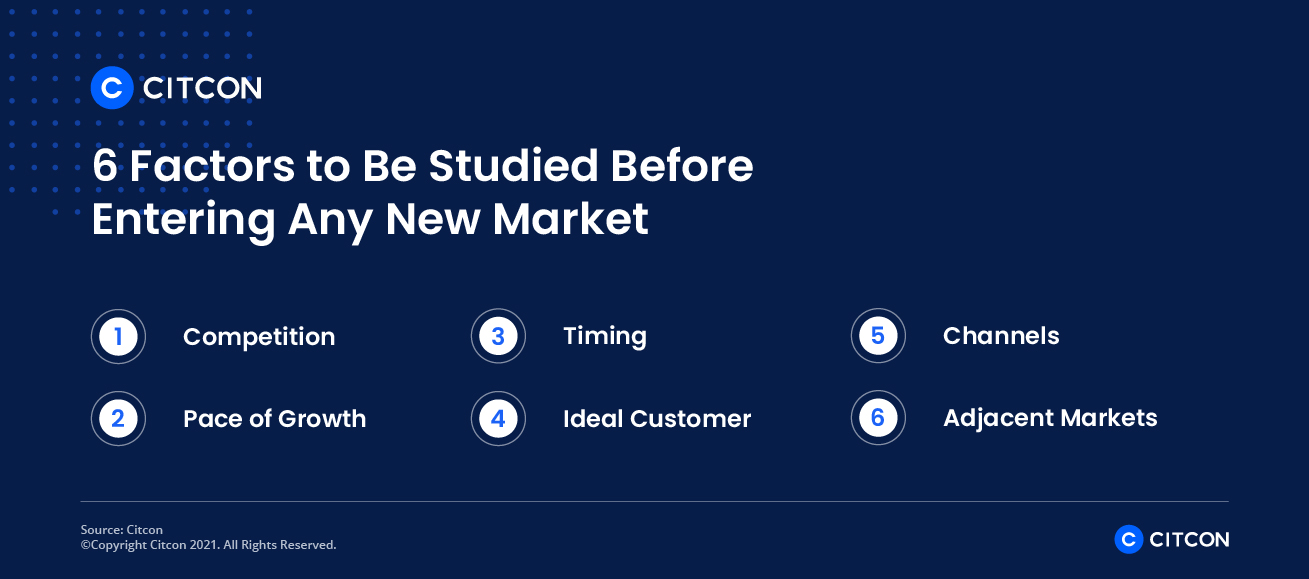
6 Factors to Be Studied Before Entering Any New Market
A new market is one your company has yet to enter. Regardless of whether your new market is foreign or domestic, be sure to study these six factors before entering:
1. Competition: When choosing to enter a new market, you will absolutely want to research the competition. Do your competitors already have established relationships with potential customers? If so, it may be harder for you to break into the market. Additionally, if there are fewer potential customers, it may not be lucrative to enter the market at all. However, if you offer something extra your competitors don’t, or feel like you are well-positioned to compete, it may be worth it. It could be worth reaching out to potential partners to see if there is interest in working together as well. Careful research will help you determine if a new market is right for you.
2. Pace of growth: You will want to consider the pace at which you’ll likely grow in the new market. This will help you adequately prepare for rapid growth, and keep customers happy. You don’t want to have extra unsold stock, but you also don’t want to miss out on potential sales because you’re out of product. When considering how fast you might grow, you will need to consider a variety of factors, including size of the market, demand, competitors, and existing infrastructure. Are you set up to take a variety of payment methods, for example? If demand is going to be slower at first, you will want to plan accordingly, as another example. This is another area where careful research will be beneficial.
3. Timing: Timing is crucial to entering a new market. Demand, competition, and more all depend on the time you enter the market. If you are the first business to offer your products, that’s vastly different than being a late entrance to the market. There are pros and cons to either scenario. Being first allows you to entrench yourself deeply in the market, making it harder for others to enter by creating barriers and making yourself dependable, even indispensable, to customers. However, entering late allows you to innovate and see what your competitors are not offering that you can, disrupting the market and gaining potential customers. Timing is crucial to the planning process.
4. The needs of your ideal customer: Entering a new market may change your ideal customer profile. Reaching potential customers with new demographics can require you to make changes to your marketing strategy as well as your payment methods. It is important to be aware of different preferences so when you enter a new market, you aren’t wasting marketing money or turning away potential customers. For example, a business entering the Chinese market may need to start accepting WeChat Pay and Alipay payments, because those two mobile wallets in particular are preferred by the majority of people in China. Without accommodating new customer preferences, there will be a lot of friction in your payment process leading to lost revenue.
Related Read: Everything You Need to Know About the eCommerce Market in China
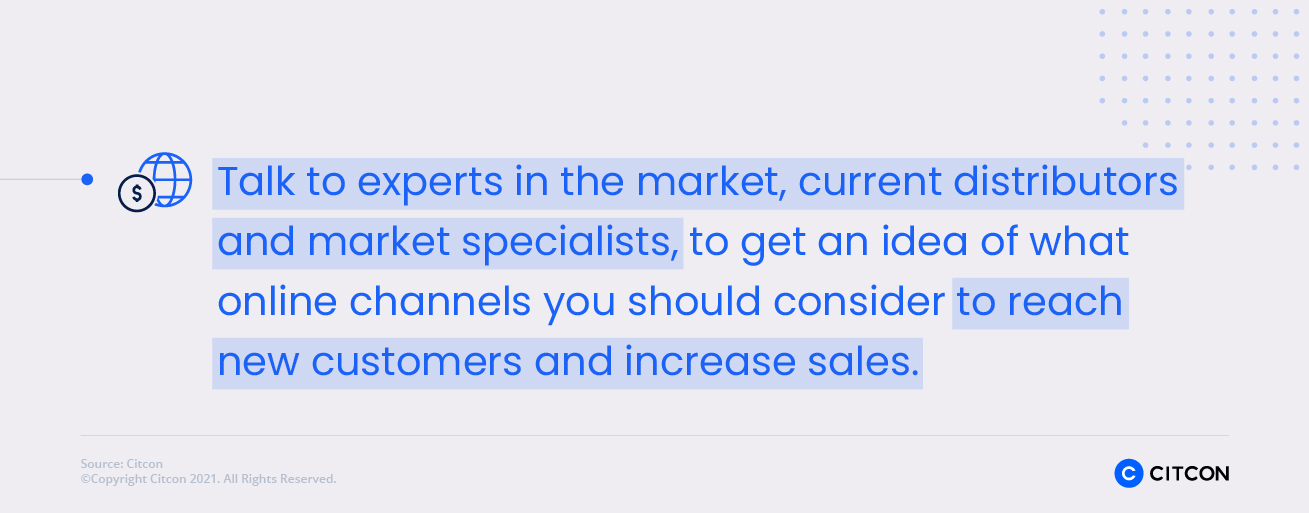
5. Channels: While you may be comfortable in the channels you’re operating in, it’s important to take stock and re-evaluate them every few years to ensure your strategy is still as effective as it needs to be. For example, you may be used to selling your items directly to the distributor, in person, via telephone, or mail order. However, there are opportunities to reach new customers and increase sales by offering an online channel option too. You’ll want to talk to experts in the market, current distributors and market specialists, to get an idea of what channels you should consider. Also, once you have distributors selling your products, make sure they are properly trained and can offer customer support regarding your products if need be. Becoming a marketplace expert will allow you to offer the best opportunities to your distributors, so investing the time in researching channels is well-spent.
6. Adjacent markets: Expanding into a neighboring market may seem like a no-brainer, but just because there is geographic proximity doesn’t mean it will be easy. When investigating an opportunity in an adjacent market, be careful not to make assumptions about the customer base. You’ll still want to do diligent research to ensure you are providing options that your new customers will want. For example, even if the market is simply across the border, you still need to research the best global payment solution when expanding there, so you don’t miss out on sales.
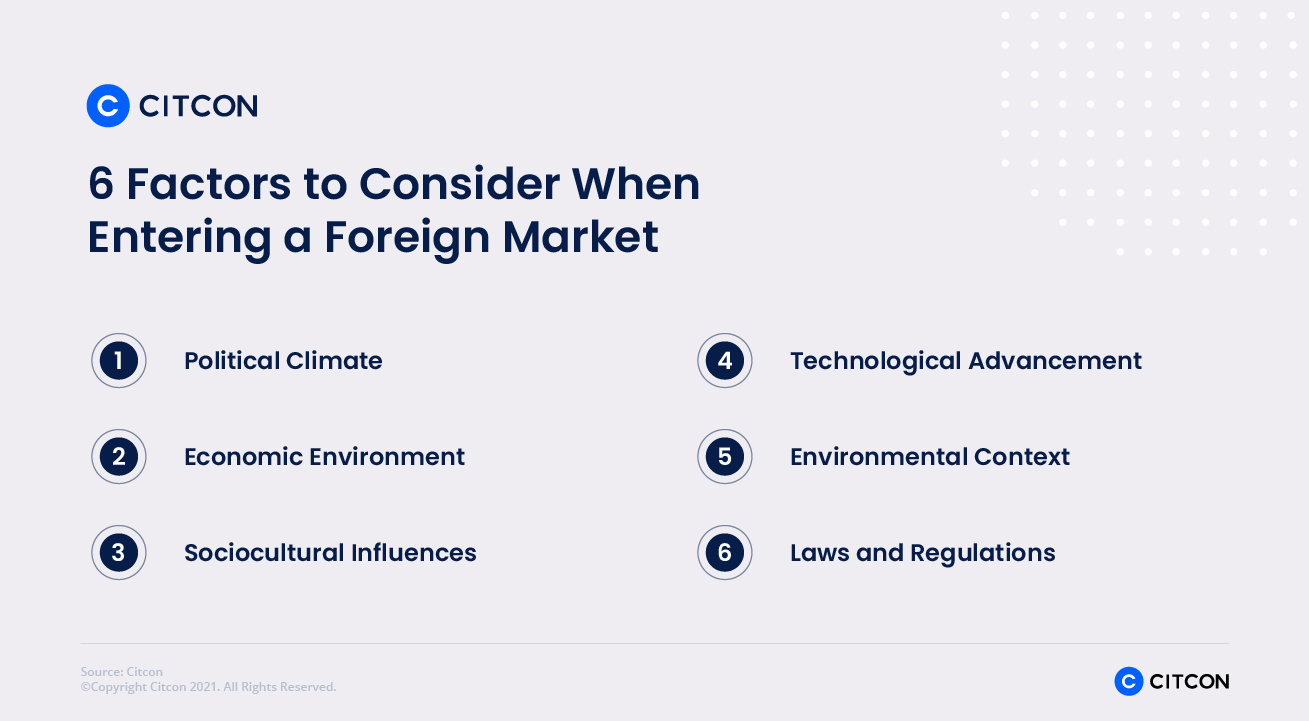
6 Factors to Consider When Entering a Foreign Market
Especially when entering a foreign market, it is vital to consider these six additional factors:
1. Political climate: Whenever you enter a new market, you want to be fully aware of the stability of the current government, and the political climate too. There are risks to entering a new country as a foreign company. Changes to laws or public opinion can make conditions unfavorable for your business. One famous example of unfavorable conditions is the United States embargo on trade with Cuba. When it was first put in place in 1958, many companies experienced drastic and sudden changes. In some cases, the Cuban government responded by seizing assets from foreign investors, and investments were totally lost. This embargo still has enormous political impact in both countries. To avoid a similar scenario, you’ll want to research trade agreements the country has entered into, local taxes, foreign trade regulations and taxes, and social welfare policies along with the stability.
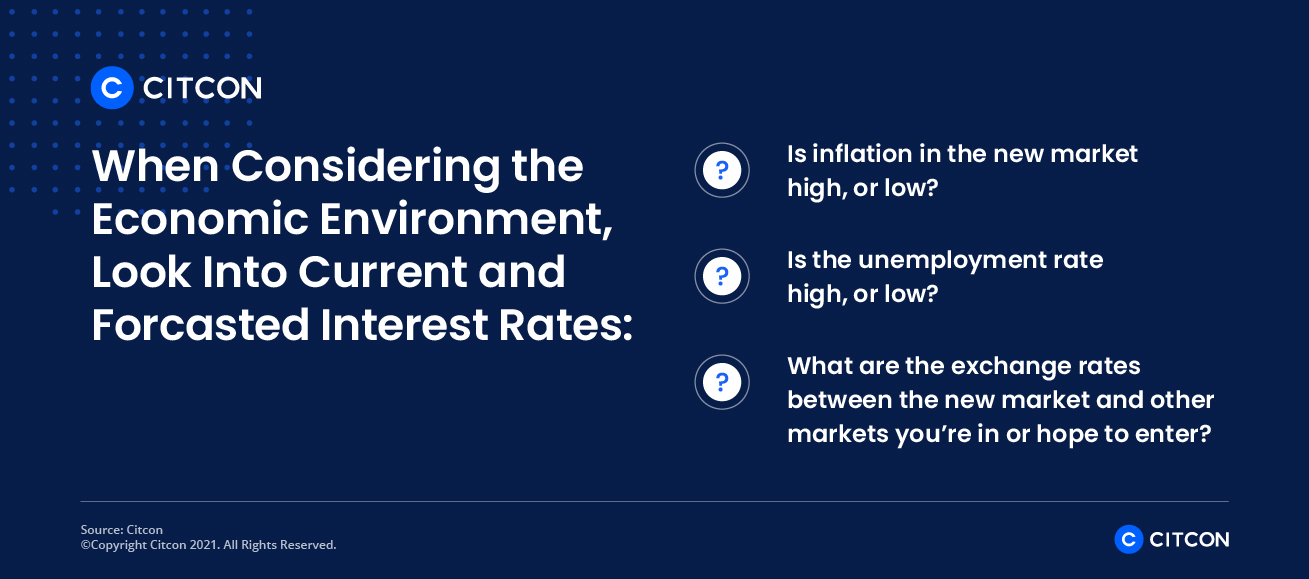
2. Economic environment: Economic and political stability are often closely linked, so you will likely uncover some of the economic information you need while researching the political climate. However, investigating the current market is important, and you should look into the current interest rates, as well as forecasted interest rates. Is inflation in the new market high, or low? Is the unemployment rate high, or low? What are the exchange rates between the new market and other markets you’re in or hope to enter? The answers to these questions, along with forecasts for each, will give you an idea of the long-term prospects in the potential market.
3. Sociocultural influences: Getting into specifics for your new market is crucial. You need to know how the marketplace operates, including factors like the dominant language and currency used. Entering a new market will not be successful if you cannot communicate with potential customers or take their payments. Luckily, a global payment solution (like Citcon) allows international customers to pay in their local currencies using their preferred payment methods. Allowing this will ensure you don’t lose sales that would be easy to keep. Additionally, your customers will be pleased that there is no additional fee assessed on top of the charges of domestic MDR for mobile wallet cross-border transactions.
4. Technological advancement: Before entering a new market, you need to know about what technology is available and accessible. However, you’ll also need to research a host of other things, such as how much funding does the local government provide for research and development? You should also have a good handle on how mature certain technology is within the marketplace. For example, is it ubiquitous and frequently used, or is it dated and being replaced and upgraded? If you sell technology-related or adjacent products, it’s especially important to know about intellectual property laws within the country, for both tech products and processes. You don’t want to run into any surprises or be stunned by sudden changes or technological developments. Research can prevent this from happening.
5. Environmental context: Knowing the market you’re entering is crucial, because you don’t want to enter an area where customers will be unfriendly to your product. For example, if a local or national charity or lobbying organization is dead-set against your products or industry, that could damage your brand and cause sales to lag. Other factors to consider include what environmental legislation is being considered, what are the favored local environmental causes, and what are regulations related to waste disposal. Having a handle on these areas will help you avoid potential pitfalls and negative public opinion.
6. Laws and regulations: Through your other research, you’ll likely learn quite a bit about local laws and regulations. But there are things in this area specifically you need to make sure to get a handle on. In addition to knowing what intellectual property standards are, you should research legal protections and consumer laws, and who has more protections. You will want to understand hiring practices, employment benefits, employee safety regulations, and all other protections for the workforce to ensure you are providing a safe, legal environment for workers. Additionally, you’ll want to research how taxes work in your home country for funds earned internationally. This will prevent you from being surprised with a massive tax bill that eats into your newly-acquired profits.
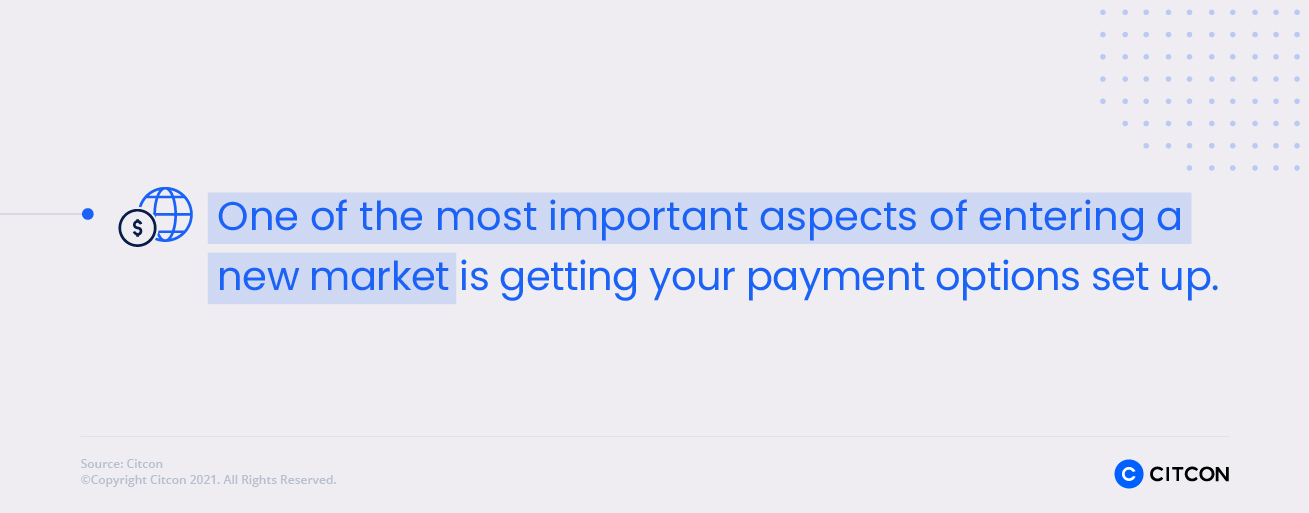
What Is the Best Way to Enter a New Market?
The best way to enter a new market is with confidence, but specifically with confidence that is earned. You can earn this confidence by following the tips provided here and researching your potential new market thoroughly. One of the most important aspects of entering a new market is getting your payment options set up. Not offering the right payment options or partnering with the wrong global payment solution could result in lost sales and unhappy customers, and your entry into the new market could be a struggle.
Citcon can help you enter a new market with full confidence. The global payment options we offer allow for fast and easy setup, making it simple and cost-effective to offer internationally preferred payment methods.
Request a demo of our global payment solution today to see how well it integrates with your business.


